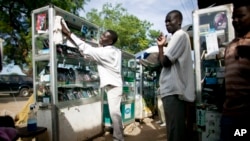The International Monetary Fund (IMF) says terrorism, armed conflicts and cross border criminality have stagnated the economies of central African states. With states spending more on arms, losing revenue and businesses, an IMF delegation finishing up an economic mission to the region warned the region’s economy may take a nose dive if current trends continue.
Mario de Ramaroczy, Senior Economist and head of the Africa department at IMF, expressed concern over rapidly growing debt and the weak financial performance of the private sector in central African nations.
"Performance in 2014 and 2015 has deteriorated as a result of stagnating revenues on the one side and increasing expenditure on the other. Expenditure has increased in both of its components, both current expenditure and capitalist expenditure. And a lot of projects, infrastructural projects are being financed by borrowing especially by foreign borrowing and when you put the two together, we have noticed a rapid increase in the debt level," said de Ramaroczy.
De Ramaroczy said overall fiscal deficit has worsened from 4.1 percent of GDP in 2013 to 5.7 percent in 2014.
"International oil prices more than halved between mid 2014 and mid 2015 and therefore for a region where 5 out of the 6 CEMAC (Central African Economic and Monetary Community) countries are oil producers, evidently this is a big oil price shock. The second major factor is that the terrorist threats, which as of mid-2014 were mostly contained within the territory of Nigeria [but] in the beginning of this year had unfortunately reached Cameroonian territory. This threat evidently disturbs economic activity and it has generated additional budgetary spending," he added.
The IMF delegation said the economy had demonstrated some resiliency and urged central African countries to implement reforms that will promote stronger and more inclusive growth and reduce social inequalities.




